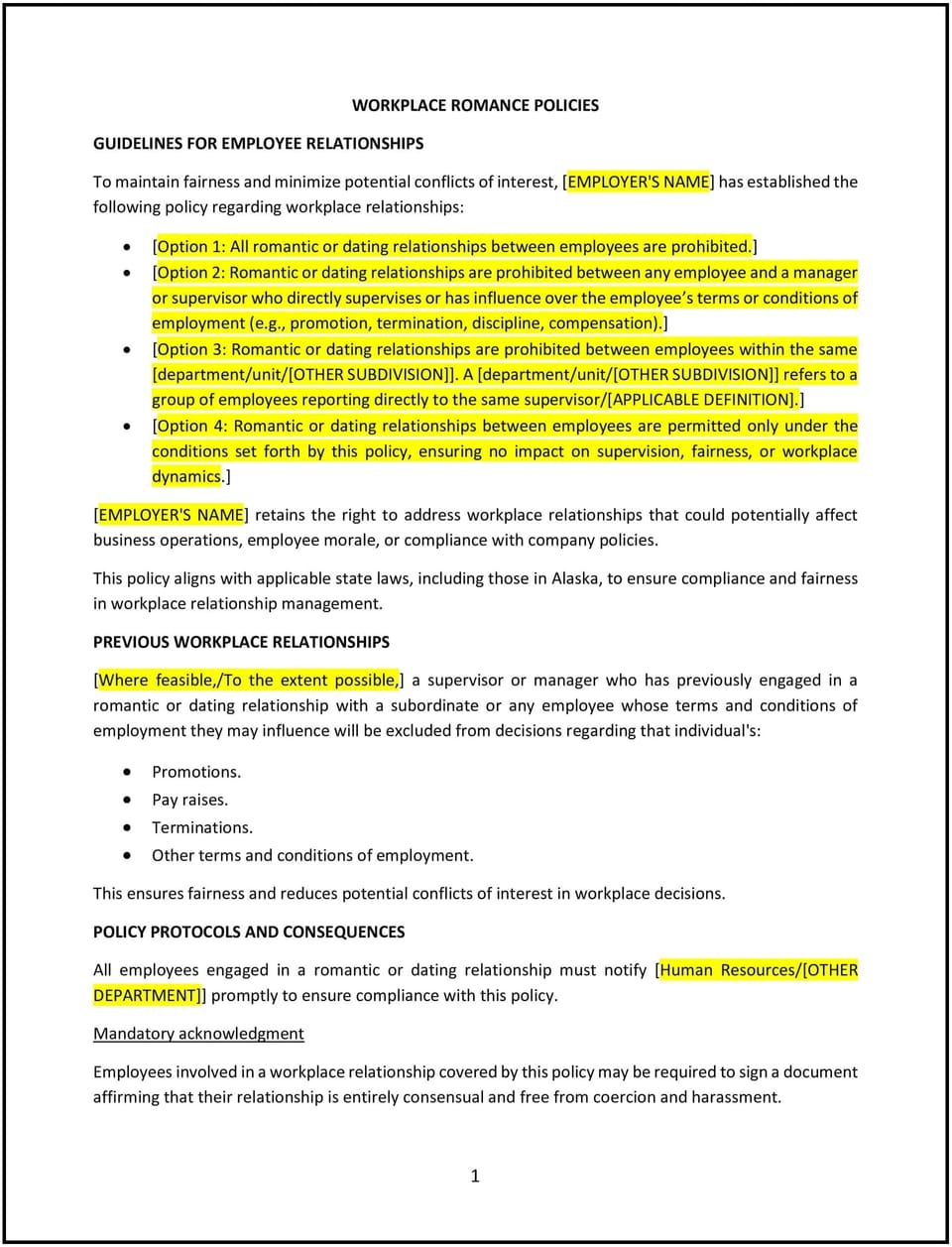Workplace romance policy (Alaska): Free template

Workplace romance policy (Alaska)
In Alaska, a workplace romance policy provides guidelines for managing personal relationships between employees to maintain professionalism and prevent conflicts of interest. This policy outlines expectations, disclosure requirements, and boundaries to ensure a respectful and inclusive work environment.
By implementing this policy, businesses can minimize potential risks while respecting employees’ privacy.
How to use this workplace romance policy (Alaska)
- Define scope: Specify which relationships are covered under the policy, such as relationships between colleagues, managers, and subordinates.
- Include disclosure requirements: Require employees to disclose romantic relationships that may create conflicts of interest or affect workplace dynamics.
- Address boundaries: Outline acceptable behaviors in the workplace and emphasize the need for professionalism at all times.
- Clarify management responsibilities: Provide guidance for managers on handling disclosures and addressing issues impartially and confidentially.
- Outline consequences: Specify disciplinary actions for policy violations, such as failure to disclose relationships or inappropriate workplace conduct.
Benefits of using a workplace romance policy (Alaska)
A workplace romance policy provides several advantages for businesses in Alaska. Here’s how it helps:
- Maintains professionalism: Ensures personal relationships do not interfere with workplace responsibilities or create disruptions.
- Reduces conflicts: Establishes clear boundaries to minimize potential favoritism or conflicts of interest.
- Promotes inclusivity: Fosters a respectful work environment by addressing concerns about workplace relationships proactively.
- Supports transparency: Encourages open communication about relationships to prevent misunderstandings or hidden issues.
- Protects the company: Reduces risks of harassment claims, legal disputes, or workplace tensions stemming from romantic relationships.
Tips for using a workplace romance policy (Alaska)
- Tailor to business size: For small teams, address potential challenges of close working relationships and emphasize disclosure.
- Promote fairness: Ensure the policy applies equally to all employees, regardless of role or seniority.
- Include training: Provide managers with guidance on handling relationship disclosures and addressing related concerns sensitively.
- Balance privacy and professionalism: Respect employees’ personal lives while emphasizing workplace standards and expectations.
- Update regularly: Revise the policy as needed to reflect changes in workplace culture, legal standards, or best practices.
Q: What types of relationships should employees disclose under this policy?
A: Employees should disclose romantic or close personal relationships that could create conflicts of interest, favoritism, or workplace tensions.
Q: How can businesses ensure fairness when managing workplace relationships?
A: Apply the policy consistently, ensure disclosures are handled confidentially, and address concerns impartially to maintain fairness.
Q: What actions should be taken if a disclosed relationship creates a conflict of interest?
A: Adjust reporting structures, reassign roles, or implement other measures to eliminate potential conflicts while respecting the employees involved.
Q: Are employees allowed to date colleagues under this policy?
A: Yes, but they must adhere to the policy’s guidelines, including disclosure requirements and maintaining professionalism in the workplace.
Q: How often should this policy be reviewed?
A: Review the policy annually or whenever significant changes occur in workplace dynamics or legal standards.
This article contains general legal information and does not contain legal advice. Cobrief is not a law firm or a substitute for an attorney or law firm. The law is complex and changes often. For legal advice, please ask a lawyer.


